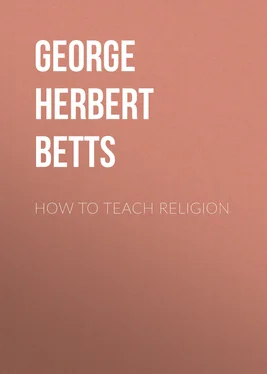George Herbert Betts - How to Teach Religion
Здесь есть возможность читать онлайн «George Herbert Betts - How to Teach Religion» — ознакомительный отрывок электронной книги совершенно бесплатно, а после прочтения отрывка купить полную версию. В некоторых случаях можно слушать аудио, скачать через торрент в формате fb2 и присутствует краткое содержание. Жанр: foreign_prose, Религиозная литература, foreign_religion, foreign_edu, foreign_antique, на английском языке. Описание произведения, (предисловие) а так же отзывы посетителей доступны на портале библиотеки ЛибКат.
- Название:How to Teach Religion
- Автор:
- Жанр:
- Год:неизвестен
- ISBN:нет данных
- Рейтинг книги:5 / 5. Голосов: 1
-
Избранное:Добавить в избранное
- Отзывы:
-
Ваша оценка:
- 100
- 1
- 2
- 3
- 4
- 5
How to Teach Religion: краткое содержание, описание и аннотация
Предлагаем к чтению аннотацию, описание, краткое содержание или предисловие (зависит от того, что написал сам автор книги «How to Teach Religion»). Если вы не нашли необходимую информацию о книге — напишите в комментариях, мы постараемся отыскать её.
How to Teach Religion — читать онлайн ознакомительный отрывок
Ниже представлен текст книги, разбитый по страницам. Система сохранения места последней прочитанной страницы, позволяет с удобством читать онлайн бесплатно книгу «How to Teach Religion», без необходимости каждый раз заново искать на чём Вы остановились. Поставьте закладку, и сможете в любой момент перейти на страницу, на которой закончили чтение.
Интервал:
Закладка:
And so this also holds for the Bible and its religious truth. Its rich lessons full of beautiful meaning may be recited and its choicest verses stored in the memory and still be barren of results, except as they are put to the test and find expression in living experience. The only true test of learning a thing is whether the learner lives it . The only true test of the value of what one learns is the extent to which it affects his daily life. The value of our teaching is therefore always to be measured by the degree to which it finds expression in the lives of our pupils. John , not grammar (nor even the Bible), is the true objective of our teaching.
Not only will this point of view vitalize our teaching for the pupils, but it will also save it from becoming commonplace and routine for ourselves. This truth is brought out in a conversation that occurred between an old schoolmaster and his friend, a business man.
The true objective saves from the rut of routine.—Said the business man, "Do you teach the same subjects year after year?"
The schoolmaster replied that he did.
"Do you not finally come to know this material all by heart, so that it is old to you?" asked the friend.
The schoolmaster answered that such was the case.
"And yet you must keep going over the same ground, class after class and year after year!" exclaimed the business man.
The schoolmaster admitted that it was so.
"Then," said his friend, "I should think that you would tire beyond endurance of the old facts, and grow weary beyond expression of repeating them after the charm of novelty and newness has gone. How do you live through the sameness and grind?"
"You forget one thing!" exclaimed the old schoolmaster, who had learned the secret of the great objective . "You forget that I am not really teaching that old subject matter at all; I am teaching living boys and girls! The matter I teach may become familiar. It may have lost the first thrill of novelty. But the boys and girls are always new ; their hearts and minds are always fresh and inviting; their lives are always open to new impressions, and their feet ready to be turned in new directions. The old subject matter is but the means by which I work upon this living material that comes to my classroom from day to day. I should no more think of growing tired of it than the musician would think of growing tired of his violin."
And so the schoolmaster's friend was well answered.
Unsafe measures of success.—It is possible to lodge much subject matter in the mind which, once there, does not function. It is possible to teach many facts which play no part in shaping the ideals, quickening the enthusiasms, or directing the conduct. And all mental material which lies dead and unused is but so much rubbish and lumber of the mind. It plays no part in the child's true education, and it dulls the edge of the learner's interest and his enjoyment of the school and its instruction.
It is possible to have the younger children in our Sunday schools from week to week and still fail to secure sufficient hold on them so that they continue to come after they have reached the age of deciding for themselves. The proof of this is all too evident in the relatively small proportion of youth in our church-school classes between the ages of fifteen and twenty-five.
It is possible to offer the child lessons from the Bible throughout all the years of childhood, and yet fail to ground sufficient interest in the Bible or religion so that in later years the man or woman naturally turns to the Bible for guidance or comfort, and fails to make religion the determining principle of the life.
The child the only true measure of success.—Let us therefore be sure of our objective. Let us never be proud nor satisfied that we have taught our class so much subject matter —so many facts, maxims, or lessons of whatever kind. We shall need to teach them all these things, and teach them well. But we must inquire further. We must ask, What have these things done for the boys and girls of my class? What has been the outcome of my teaching? How much effect has it had in life, character, conduct? In how far are my pupils different for having been in my class, and for the lessons I have taught them? In how far have I accomplished the true objective of my teaching?
Let us never feel secure merely because the children are found in the Sunday school, and because the statistical reports show increase in numbers and in average attendance. These things are all well; without them we cannot do the work which the church should do for its children. But these are but the externals, the outward signs. We must still inquire what real influence the school is having on the growing spiritual life of its children. We must ask what part our instruction is having in the making of Christians. We must measure all our success in terms of the child's response to our efforts. We must realize that we have failed except as we have caused the child's spiritual nature to unfold and his character to grow toward the Christ ideal.
1. As you think of your own teaching, are you able to decide whether you have been sufficiently clear in your objective? Have you rather assumed that if you presented the lessons as they came the results must of necessity follow, or have you been alive to the real effects on your pupils?
2. Are you able to discover definite changes that are working out in the lives of your pupils from month to month as you have them under your instruction? Are they more reverent, more truthful, more sure against temptation, increasingly conscious of God in their lives? What other effects might you look for?
3. Do you think that the church is in some degree overlooking its most strategic opportunity in not providing more efficiently for the religious education of its children? If more attention were given to religious nurture of children, would the problems of evangelism be less pressing, and a larger proportion of adults found in the church? What can the church school do to help? What can your class do?
4. Do you love the matter that you seek to teach the children? Do you love it for what it means to you, or for what through it you can do for them? Do you look upon the material you teach truly as a means and not as an end? Are you teaching subject matter or children?
5. Do you feel the real worth and dignity of childhood? Do you sometimes stop to remember that the ignorant child before you to-day may become the Phillips Brooks, the Henry Ward Beecher, the Livingstone, the Frances Willard, the Luther of to-morrow? Do you realize the responsibility that one takes upon himself when he undertakes to guide the development of a life?
6. Can you now make a statement of the measures that you will wish to apply to determine your degree of success as a teacher? It will be worth your while to try to make a list of the immediate objectives you will seek for your class to attain in their personal lives. Keep this list and see whether it is modified by the chapters that lie ahead.
Harrison, A Study of Child Nature.
Moxcey, Girlhood and Character.
Dawson, The Child and His Religion.
Forbush, The Boy Problem.
Richardson (Editor), The American Home Series.
Richardson, Religious Education of Adolescents.
CHAPTER III
THE FOURFOLD FOUNDATION 1 1 The point of view and in some degree the outlines of this and several following chapters have been adapted from the author's text "Class-Room Method and Management," by permission of the publishers, The Bobbs-Merrill Co ., Indianapolis.
Интервал:
Закладка:
Похожие книги на «How to Teach Religion»
Представляем Вашему вниманию похожие книги на «How to Teach Religion» списком для выбора. Мы отобрали схожую по названию и смыслу литературу в надежде предоставить читателям больше вариантов отыскать новые, интересные, ещё непрочитанные произведения.
Обсуждение, отзывы о книге «How to Teach Religion» и просто собственные мнения читателей. Оставьте ваши комментарии, напишите, что Вы думаете о произведении, его смысле или главных героях. Укажите что конкретно понравилось, а что нет, и почему Вы так считаете.











